2021
- Award of the Giga-Hertz-Prize to Christina Kubisch, production award for Yvette Janine Jackson for the SWR Experimentalstudio.
The SWR Experimentalstudio turns 50 and celebrates this anniversary with two concerts in Freiburg. In the first anniversary concert, Márton Illés' "Three skEtches" and Marta Gentilucci's "Auf die Lider" is being premiered.
- Composing with Artificial Intelligence? Johannes Motschmann explores this question in his composition "AION". World premiere in Frankfurt. The video shows the composer Motschmann working together with sound director Thomas Hummel in the SWR Experimentalstudio.
- The SWR Experimentalstudio will also be present at the Bregenz Festival, in 2021 with a world premiere of Alexander Moosbrugger's opera "WIND". In the run-up to the premiere, music computer scientist and sound director Thomas Hummel traveled to the world-renowned organ builder Rieger in Schwarzach to set up an organ control system. This is part of a room organ specially designed for the opera, which was heard in public for the first time at the premiere on August 19, 2021. This is an extremely ambitious and highly complex programming project: 172 organ pipes are finely controlled by software. The organ building company Rieger has also developed a world first for this: so-called "actuators" that manage the mechanical opening of the valves. The film shows the result of the development work.
- World premiere of Detlef Heusinger's "JUKEBOXOPERA" at the Freiburg Theater. The picture gallery shows scene photos from the production at the Freiburg Theater.
- World premiere of Andreas Eduardo Frank's "Sensitive Punch" at Gare du Nord (Basel), with Rei Nakamura, piano.

2020
- Award of the Giga-Hertz-Prize to Alvin Lucier, production award for h0nh1m for the SWR Experimentalstudio.
- Nevertheless, a concert with the SWR Experimentalstudio in Freiburg takes place: in September in the Christuskirche with a world premiere by Maurilio Cacciatore and a work by Luigi Nono.
- The year 2020 is marked by the corona pandemic. Almost all concerts are canceled. Instead, there are productions, such as the recording of the concert that should have taken place at the Berlin Ultraschall Festival.
2019
- Award of the Giga-Hertz Prize to Éliane Radigue, production prize for Hongshuo Fan for the SWR Experimentalstudio.
- The jurors of the association "Preis der deutschen Schallplattenkritik" award the NEOS production "Philippe Manoury - Le temps, mode d'emploi", recorded by the GrauSchumacher Piano Duo and the SWR Experimentalstudio with the annual prize 2019.

- And another opera production: Chaya Czernowin's opera "Heart Chamber" is premiered at the Deutsche Oper Berlin. The picture gallery shows various scene photos.




- The SWR Experimentalstudio charitable: For the restoration of the organ pipes in the Freiburg Friedenskirche, the Experimentalstudio gives a benefit concert. Among other pieces, Chaya Czernowin's "Habekhi" is premiered for the occasion.

- And another novelty: The Experimentalstudio with a world premiere of Fred Popovici's "String Quartet" at the George Enescu Festival in Bucharest.
- The SWR Experimentalstudio publishes "Live Electronics at the SWR Experimentalstudio". With this, the (music) history of the unique sound laboratory is published. In a spotlight-like manner, various essays examine important compositions that were created there and have become milestones. In addition, practice-oriented insights into the "workshop Experimentalstudio" are provided.

- The Experimentalstudio for the first time on concert tour in Copenhagen: invited to play at the KLANG Avantgarde Music Festival. The picture shows the sound directors Maurice Oeser, Lukas Nowok and Constantin Popp in the concert situation, in the background Detlef Heusinger as conductor.
- Detlef Heusinger's new version of Act 3 of Berg's "Lulu" is premiered at the Bremen Theater. The picture gallery shows various scene photos.





2018
- Award of the Giga-Hertz-Prize to The Hub, production award for Oscar Éscudero for the SWR Experimentalstudio.
- World premiere of Johannes Maria Staud's opera "Die Weiden" at the Wiener Staatsoper.
- The SWR Experimentalstudio travels to New York City to perform at the Time:Spans Contemporary Music Festival with works by Lara, Haas and a world premiere by Sabrina Schroeder.
- Mark Andre's "WUNDERZAICHEN" is resumed at the Stuttgart Opera with five performances.

- World premiere of José María Sánchez Verdú's "ARGO" at the Schwetzinger SWR Festspiele. In the same year, the opera is performed four times at the Mainzer Staatstheater. What the golden horns in the opera are all about, composer José María Sánchez Verdú and sound director Joachim Haas explain in the video.
- World premiere of Peter Ablinger's "WEGNEHMEN AUFHÖREN AUSLEEREN" in Bergen at the Borealis Festival.
2017
- Award of the Giga-Hertz Prize to Laurie Anderson, production awards for Maurilio Cacciatore and Hans Tutschku for the SWR Experimentalstudio.
- Luther Year - the Experimentalstudio invited to the Goethe Institute in Ljubljana with two concert programs.































- The SWR Experimentalstudio at the Acht Brücken Festival in Cologne with works by Zuraj, Nono, Chin and Wang.
- World premiere of Hilda Paredes' "Sortilegio" at the Festival d'Automne à Paris.
- World premiere of the opera "Ciudad de las mentiras" by Elena Mendoza at the Teatro Real Madrid.

2016
- Award of the Giga-Hertz Prize to Curtis Roads, production award for Huihui Cheng for the SWR Experimentalstudio.
- Luigi Nono's "Prometeo" is performed eleven times at the Theater Luzern, now more than 80 times since its premiere.

- The SWR Experimentalstudio performs Pierre Boulez's "Répons" under the direction of Kent Nagano in Hamburg's Michel.

- World premiere of the opera "Kaspar Hauser" by Hans Thomalla in Freiburg.
- matrix on tour takes place in Ljubljana.
2015
- World premiere "über" for clarinet and orchestra by Mark Andre in Donaueschingen.
- matrix15 takes place in collaboration with the Siemens Musikstiftung in Montréal (Canada) and Freiburg. In this context Anthony Tan's "un/divided" for alto, flute, clarinet, guitar, percussion, viola, violoncello and live electronics is premiered.

- World premiere of "The key of presence" for two pianos, video and live electronics by Birgitta Muntendorf in Stuttgart
- CD recording by SWR Sinfonieorchester Baden-Baden and Freiburg and the SWR Experimentalstudio of the "...auf..." tryptichon by Mark Andre is included in the annual best list of the "Preis der deutschen Schallplattenkritik".
2014
- This year "matrix on tour" takes place in Curitiba (Brazil) in cooperation with the Siemens Music Foundation.
- Luigi Nono's "Prometeo" is performed at the Gashouder Amsterdam.

- World premiere of "Schwarzmärkte" for ensemble and electronics by Brice Pauset in Witten.
- World premiere of the opera "WUNDERZAICHEN" by Mark Andre at the Staatsoper Stuttgart.
2013
- Award of the Giga-Hertz Prize to John Chowning, Francis Dhomont, production awards to Roque Rivas and Ying Wang for the SWR Experimentalstudio.
- World premiere "Atlas - Inseln der Utopie" for five vocal soloists, twelve instrumentalists, auraphone, live electronics and three rooms obligati by José María Sánchez Verdú in Hannover.
- matrix13 takes place for the first time in cooperation with the Siemens Music Foundation in Victoria (Canada) and Freiburg (Germany).
- World premiere of "La Quintina" for string quartet and electronics by Joshua Fineberg in Berlin.

2012
- Award of the Giga-Hertz Prize to Emmanuel Nunes and Pauline Oliveros, production awards to Dániel Péter Biró and José Miguel Fernandez for the SWR Experimentalstudio.
- The matrix Academy goes "on tour" to Amsterdam and Warsaw for the first time. During the matrix Academy in Amsterdam, the synthesis of non-European instruments and musical traditions with live electronics is explored and expanded through collaboration with the Atlas Ensemble.

- World premiere of "Feigels Mosaik" by Beat Gysin, a staged concert for vocal and instrumental ensemble, tape, live electronics and headphones in Basel.

- World premiere "Peter Kien - eine akustische Maske" for actors, ensemble and live electronics by Emanuel Nunes in Witten.
2011
- Award of the Giga-Hertz-Prize to Pierre Boulez, production prizes for Aaron Einbond, Madjid Tahriri, Anthony Tan for the SWR Experimentastudio.
- World premiere of "7th String Quartet" by Georg Friedrich Haas in Lucerne.
- The works of the "Berio Projekt" are premiered (for the most part) in Würzburg. Composers are Marta Gentilucci, Jamilia Jazylbekova, Marko Nikodijevic, Farangis Nurulla-Khoja, Mariana Ungureanu, Vito Zuraj. This project is created for composers who have excelled at matrix Academy. They are to incorporate their respective cultural backgrounds as well as the template, Luciano Berio's "Folk Songs", when composing.

- matrix11 again takes place in Freiburg.
2010
- Award of the Giga-Hertz Prize to Gottfried Michael König, production prizes for Dániel Péter Biró and José Miguel Fernandez for the SWR Experimentalstudio.
- World premiere of the opera "Metanoia" by Jens Joneleit in Berlin.
- matrix10 again takes place in Freiburg.

- World premiere of "Erstarrte Schatten" by Brice Pauset for large orchestra, six solo voices and electronics in Munich.
- The "virtual tour" goes online. The Experimentalstudio homepage invites you to an interactive tour of his studio and explains the electronic instruments.
2009
- Award of the Giga-Hertz Prize to Jean-Claude Risset, production prize to Kee Young Chong for the SWR Experimentalstudio.
- World premiere of the chamber opera "AURA" by José María Sánchez Verdù in Madrid.
- Founding of the matrix academy of the SWR Experimentalstudio in cooperation with the Allianz Cultural Foundation. It is an international forum for knowledge exchange between professionals involved in electronic as well as live electronic music.
- The ENSEMBLE EXPERIMENTAL is formed by internationally recognized artistic personalities and instrumental soloists. It is especially dedicated to the performance of live electronic works in close cooperation with the SWR Experimentalstudio.

- World premiere of "Fragments on Fragility" by Hector Parra for string quartet and live electronics in Witten.

2008
- Award of the Giga-Hertz Prize to Trevor Wishart, production prizes Dai Fujikura and João Pedro Paiva de Oliveira for the SWR Experimentalstudio.
- World premiere of "üg" for ensemble and live electronics by Mark Andre at the Alte Oper in Frankfurt.
- Announcement of the Staubach Prize, a composition competition for string quartet with live electronics, in cooperation with the International Music Institute Darmstadt respectively the Darmstadt Summer Courses as well as the Arditti Quartet. The prize is sponsored by the Harry and Alice Eiler Foundation. The prizewinner is the Brazilian composer Felipe Lara for his composition "Tran(slate) - second string quartet".
- World premiere of "...und..." by Georg Friedrich Haas for chamber ensemble and live electronics at the Dampfzentrale in Bern.
2007
- First announcement of the Giga-Hertz-Preises together with the ZKM (Center for Art and Media) and the city of Karlsruhe. Prize winner is Jonathan Harvey, production prizes for Mark Andre and Flo Menezes for the SWR Experimentalstudio.

- Course of interpretation of works by Luigi Nono with integrated live electronics, as well as works for tape in Venice in collaboration with the Fondazione Archivio Luigi Nono and the Fondazione Giorgio Cini.
- World premiere "...auf... III" by Mark Andre for large orchestra and live electronics at the Donaueschinger Musiktage.
- World premiere of "El Viaje a Simorgh", an opera in two acts by José María Sánchez Verdú, in Madrid.

- World premiere of "Maim", a triptych by Chaya Czernowin for large orchestra, soloist quintet with tuba as main solo and live electronics, in Berlin.
2006
- Joachim Haas is commissionary director of the SWR Experimentalstudio. From October 1, the Experimentastudio will have a new leadership: Detlef Heusinger will become artistic director.

- The Bayerischer Rundfunk becomes a cooperation partner of the SWR Experimentalstudio.
- World premiere of "Mixtur 2003" by Karlheinz Stockhausen in Salzburg.
2004
- In the years 2002 to 2004, the AreC controller (Advanced Remote Control) is developed in cooperation with the company DFM from Lahr. It is designed as an "instrument" for the interpretation of live electronic music. The controls of the AreC send and receive OSC parameters and are transmitted via Ethernet. This allows the controller to control all OSC-capable hardware and software.

2002
- As a contribution to basic musical research and for educational purposes, the SWR Experimentalstudio published the multimedia sound library "The Virtual Orchestra" in 2002. It serves composers and instrumentalists as an orientation guide to new playing techniques.
- In the years 2002 to 2005, the project "Data Backup of the Historical Tape Archive" will be carried out. The analog tape inventory is transferred to new digital storage media.
- World premiere of "HUM" by Julio Estrada for five or six voices and live electronics at the Donaueschinger Musiktage.

2001
- World premiere of "sintflut", a video triptych by Detlef Heusinger for three orchestral groups and five-channel tape, at the Donaueschinger Musiktage.
- World premiere of „Kaktus unter Strom“ by Vinko Globokar for oboe, horn, double bass, live electronics, tape and scenic acts in Karlsruhe.
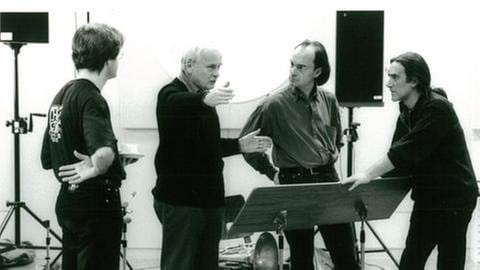
1997
- The Zentrum für Kunst und Medientechnologie Karlsruhe (ZKM) becomes a cooperation partner of the Experimentalstudio.
1993
- The digital matrix mixer is developed. It is a further development of the Koppelfeld, now completely digitally designed. The compact unit is modular and can be conveniently used on the studio's many concert tours. Meanwhile, the halaphone is also integrated directly into the unit. The digital matrix can distribute and move the sound to up to 64 speakers in the room. Whether the mobility as the orientation for a differentiated interpretation of live electronic works, the matrix mixer is exemplary. It is used for the first time in the opera "Don Quichote de la Mancha" by Hans Zender.
1992
- The Experimentalstudio moves to the new premises of SWF's Freiburg regional studio in Kartäuserstraße. On an area of more than 700 m2, it is expanded according to the latest technical standards into a sound laboratory that is unique in Germany. The transformation of analog studio technology into the digital age begins.
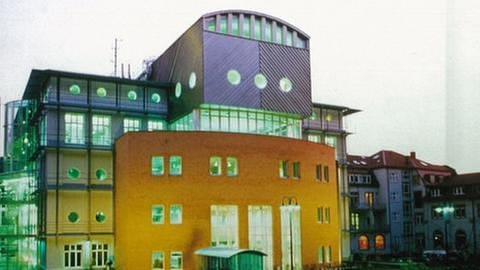
- World premiere of "Sinfonie X" by Dieter Schnebel for large orchestra, alto voice, tape and live electronics at the Donaueschinger Musiktage.
1990
- The Experimentalstudio, in collaboration with the Sennheiser company, developes a world novelty: the Digital Filterbank/Vocoder. This breaks down the frequency range of our hearing (65 Hz to 16 kHz) into 48 small sections ("bandpasses"). Debut with André Richard's work "Glidif" at the Exstasis Festival in Geneva.
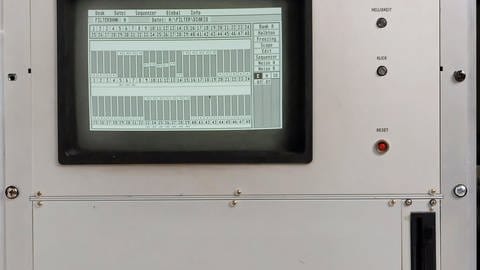
1989
- Swiss composer and conductor André Richard becomes the new artistic director of the Experimentalstudio.

- World premiere of the music theater work "Der Turm" by Detlef Heusinger in Bremen, the first opera with live electronics in repertory theater.
- World premiere of "Monotonien I-V" by Dieter Schnebel for piano and live electronics at the Donaueschinger Musiktagen.
1988
- World premirere of "La lontananza nostalgica-futura" by Luigi Nono for solo-violin, live electronics and tape in Berlin.
1987
Dieter Schnebel becomes artistic advisor of the Experimental Studio until the end of 1989.
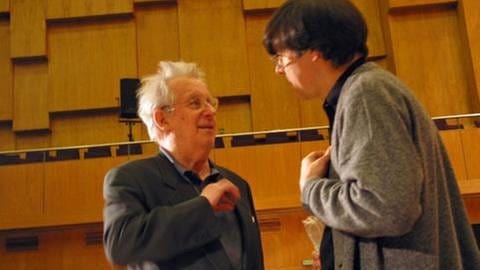
- Another world premiere at the Donaueschinger Musiktage: Luigi Nono's "Post-Prae-Ludium No. 1 per Donau" for tuba and live electronics.
1986
- The work "Wandlungen" for 25 instruments and live electronics by the Portuguese composer Emmanuel Nunes is premiered at the Donaueschingen Music Festival. From the Experimentalstudio, he is supported by Rudolf Strauß and Hans Peter Haller.
- "Echanges" by André Richard for orchestra and live electronics is premiered in Geneva. At this time, no one suspects that the Swiss composer will one day become head of the Experimentalstudio.

1985
- World premiere of "Prometeo", 2nd version, by Luigi Nono in Milan.
1984
- The original version of Luigi Nono's "Prometeo. Tragedia dell' ascolto" for two sopranos, two altos, tenor, baritone, mixed choir, orchestra and live electronics is premiered at the Biennale di Venezia in the Chiesa di San Lorenzo. Especially for the performance of the work, architect Renzo Piano built a "barca" in the (empty) church, a wooden nave hull, which should have a lasting effect on the spatial sound.
1983
- Luigi Nono becomes artistic advisor of the Experimental Studio until the end of 1986.
- For the first time, a one-week seminar on "Electronic Sound Transformation" is held in the Experimentalstudio with Luigi Nono, Helmut Lachenmann, Roberto Fabbriciani and Hans Peter Haller.
- World premiere of "Erniedrigt-Geknechtet-Verlassen-Verachtet ..." by Klaus Huber for vocal soloists, choir, orchestra and tape at the Donaueschinger Musiktage.
1982
World premiere of "Quando stanno morendo diario. Polacco no 2" by Luigi Nono for three sopranos, mezzo-soprano, flute, cello and live electronics in Venice.
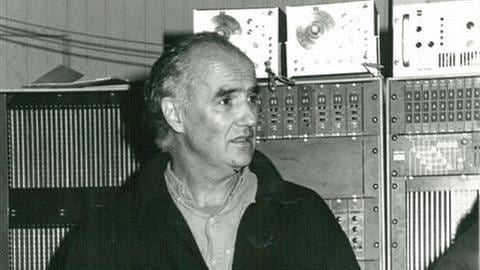
1981
- World premiere of "Répons" by Pierre Boulez for six soloists, chamber ensemble, computer sounds and live electronics at the Donaueschinger Musiktage.
- World premiere of "Das atmende Klarsein" by Luigi Nono for bass flute, eight-part solo choir and live electronics in Florence.
1980
- The mixing matrix is developed. With 96 inputs and 96 outputs each, the mixing matrix is one of the largest of its time. It can be programmed by computer and from then on forms the heart of the daily live electronic work. Famous works such as "Das atmende Klarsein" and "Con Luigi Dallapiccola" by Luigi Nono were realized with the coupling field.
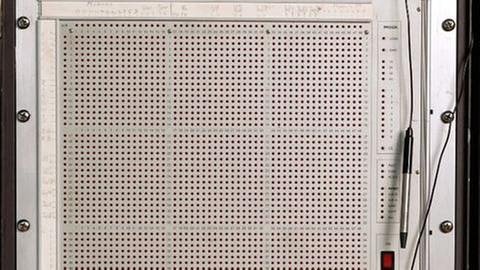
- Luigi Nono becomes a permanent studio guest at the Experimentalstudio. Until 1989 he composes his entire late work in the Freiburg studio.
1979
- The Spanish compose Cristóbal Halffter becomes artistic advisor of the Experimentalstudio until the end of 1982. During this time he composes six works in a wide variety of instrumentation (including tape compositions) at the Experimentalstudio.
1978
- Kazimierz Serocki's "Pianophonie" for piano, electronic sound transformation and orchestra, composed from 1976 to 1978 on commission from Südwestfunk Baden-Baden, is premiered at the "Recontres internationales de musique contemporaine" in Metz. In this work the composer uses ring modulators, sine oscillators, the quint bandpass filter, the halaphone and delay devices.
1977
- World premiere of "Time and Motion Study II" by Brian Ferneyhough for vocalizing cellist and live electronics at the Donaueschinger Musiktage.
1973
- Since the late 1960s, Pierre Boulez has been visiting the Südwestfunk and experimenting with its unique equipment.
- inally, in 1973, "... explosante-fixe..." by Pierre Boulez for eight instruments and live electronics is premiered at Alice Tully Hall in New York. This is the first overseas trip of the Experimentalstudio.
1971/1972
- In 1971, the "Experimentalstudio of the Heinrich Strobel Foundation of Südwestfunk" is founded, with Hans Peter Haller as its first director.
- The Halaphone is developed by Dipl.-Ing. Peter Lawo in cooperation with the Experimentalstudio. It enables sounds to be distributed and moved electronically in space. This invention represents an extremely significant step, as now space with all its specifics and parameters is also available for compositional work.
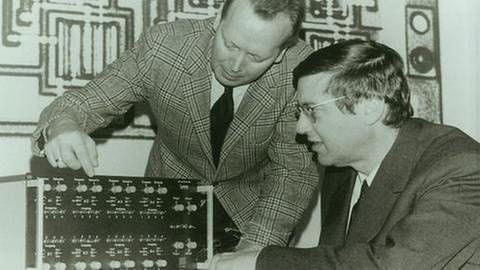
- The first halaphone was used during the Donaueschinger Musiktage in 1971 for the premiere of the work "Planto por las Victimas de la Violencia" by Cristóbal Halffter. The Halaphon received its name from Dr. Otto Tomek, then head of the music department at Südwestfunk. It is an acronym of the surnames Haller and Lawo. For compositional work in the Experimentalstudio, the invention represents an extremely significant step, as it enables the movement of audio signals via loudspeakers distributed in the room and thus a free influencing of the room sound.
1970
- Strobel awards a double commission to composer Cristóbal Halffter and Hans Peter Haller, who is to create the electronic design. It is the birth of "Hallers toller Kiste 4", from which the Lawo company will build the first "fully electronic sound control device for moving a sound source in a given space": the Halaphon - a world first.
1969/1970
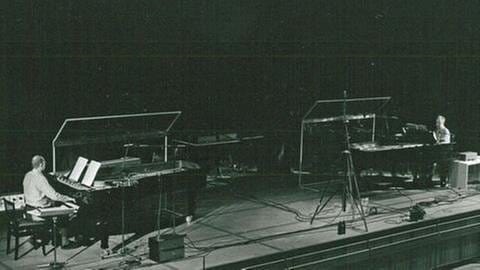
- Heinrich Strobel, then head of the music department at Südwestfunk, commissions Karlheinz Stockhausen to compose a work for two pianos and ring modulator. The result is "Mantra," which is premiered at the Donaueschinger Musiktage in 1970 and is considered an important cornerstone for the emergence of the Experimentalstudio.
- Together with the engineer Peter Lawo, Hans Peter Haller develops a small sound converter.
- At the same time, the "Laboratorium" moves into the SWF regional studio in idyllic Freiburg-Günterstal, which was housed in the former hotel and restaurant "Zur Kyburg".
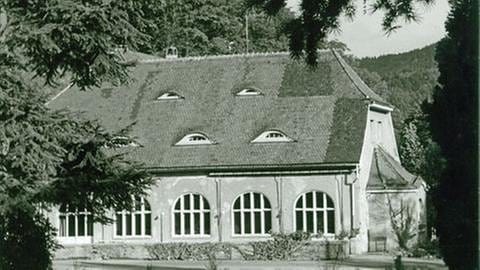
- The hotel was built in 1876 by Georg Anselm Trescher. The picture shows the annex of the hotel, in which the Experimentalstudio set up its premises and from then on was located there until the move to the city center.
1956
- On the Bürck-Heck basis and with his Märklin construction kit, Hans Peter Haller tinkers a ring modulator. He sees this as an answer to the question of whether the "lively sound of conventional instruments can be changed". Later it becomes clear that this is the beginning of electronic sound transformation.
1953
- SWF employees Dr. Bruno Heck and Fred Bürck invent a frequency converter that can transform sounds in real time, i.e. immediately audible. A weather-sensitive one-off, it is now in the Deutsches Museum in Munich. Musically, however, a sensation that drives musicians and composers like Otto Lünning ("father of electronic sound transformation") or Lejaren Hiller from Illinois University, USA, to Baden-Baden.
1950
- During this period, Heinrich Strobel commissions the most important compositions from Stravinsky, Hindemith, Stockhausen and Boulez; the time has come for something new. For a "ensemble" that, in addition to the symphony orchestra (committed to tradition as well as to the public cultural mandate), makes the music of this time audible. Although there are already devices for artificial sounds with oscillators (Friedrich Trautwein's "Trautonium," 1930), there are none for "living" sounds: the computer as an instrument has yet to be discovered.